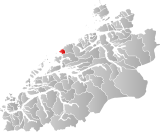|
Bud (municipality)
Bud is a former municipality in Møre og Romsdal county, Norway. The municipality existed from 1838 until its dissolution in 1964 when it was merged into Fræna Municipality (now part of the present-day Hustadvika Municipality). The 35-square-kilometre (14 sq mi) municipality was centered around the village of Bud which was the administrative centre of the municipality. Bud Church was the main church for the municipality.[3] HistoryOn 1 January 1838, the prestegjeld (parish) of Bud was established as a municipality (see formannskapsdistrikt law). On 1 January 1878, one area of Bud (population: 15) was transferred to the neighboring Kvernes Municipality. Then on 1 January 1891, the Bollien farm area (population: 15) was also transferred to Kvernes Municipality. On 1 July 1918, Bud Municipality was divided in two: the eastern part remained as Bud (population: 1,397) and the western part became the new Hustad Municipality (population: 2,062).[4] During the 1960s, there were many municipal mergers across Norway due to the work of the Schei Committee. On 1 January 1964, there was a merger involving Bud Municipality (population: 1,610) in the west, Hustad Municipality (population: 2,196) in the north, and Fræna Municipality (population: 3,430) in the south, forming a new, larger Fræna Municipality.[4] NameThe municipality (originally the parish) is named after the old village of Bud (Old Norse: Búðaver) since the first Bud Church was built there. The name comes from the word búð which is an old word for the modern Norwegian word rorbu which means "fishing hut", such as is commonly seen on the shores of fishing villages.[3][5] GovernmentWhile it existed, this municipality was responsible for primary education (through 10th grade), outpatient health services, senior citizen services, unemployment, social services, zoning, economic development, and municipal roads. During its existence, this municipality was governed by a municipal council of directly elected representatives. The mayor was indirectly elected by a vote of the municipal council.[6] Municipal councilThe municipal council (Herredsstyre) of Bud was made up of 17 representatives that were elected to four year terms. The party breakdown of the final municipal council was as follows:
MayorsThe mayors of Bud (incomplete list):
See alsoReferences
|
|||||||||||||||||||||||||||||||||||||||||||||||||||||||||||||||||||||||||||||||||||||||||||||||||||||||||||||||||||||||||||



